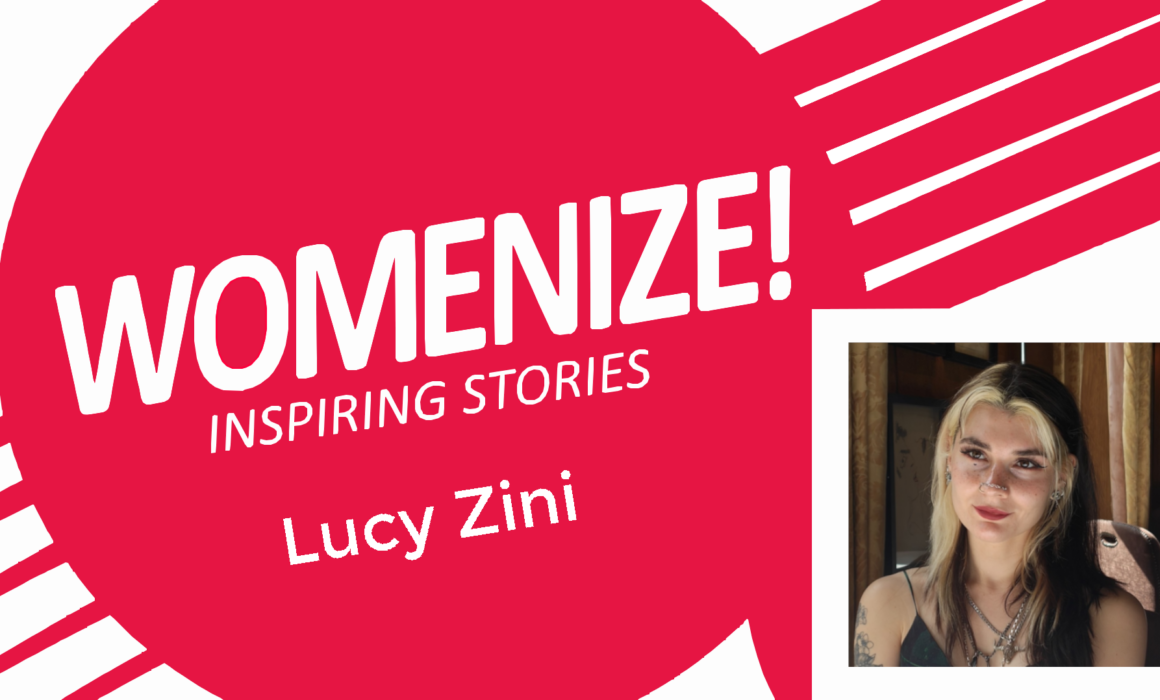Lucy Zini – Womenize! – Inspiring Stories
Womenize! – Inspiring Stories is our weekly series featuring inspirational individuals from games and tech. For this edition, we talked to Lucy Zini, Environment Concept Artist at Compulsion Games. She speaks about how she balances creativity with practicality in concept art, draws inspiration from travel and real-world references, and emphasizes patience, passion, and self-confidence as keys to thriving in the game art industry. Read more about Lucy here:
Hi Lucy! As an Environment Concept Artist, how do you approach balancing your creative passion with the practical demands of game development? Looking back, did your educational background help you prepare for navigating this balance?
I am fortunate in that the studio I work for prioritises creativity in their games, I feel like rarely do I need to stunt any creativity in order to allow for the more practical demands of game development. If anything, I often feel pushed to make my work more unique and out there than I otherwise would. In the cases where I do need to think more about practicality, it’s generally in terms of producing work that gives more information to the 3D artists or Level design outside of a polished concept. But I’ve always seen Concept Art as something that is to provide support and inspiration to the rest of the studio, so it just feels natural to spend some time on these things. I also find this kind of work creates a bit of a break between artwork, and often improves my own understanding of what I’m doing as a bonus.
I’m sure this way of thinking started from doing my degree in game art and design, as we were encouraged to work together and take part in Game jams. I also like to have things to make sense and have a reason behind them – this helps guide my art and probably stops them from going too left field at the same time.
Your love for travel and exploration clearly fuels your art. How do these experiences influence your creative process, and how has your artistic vision evolved from your early days studying game art to now?
I’ve found travelling and looking for ideas through the world around me has mostly helped in keeping inspiration, sometimes I’ll see a type of architecture, composition, plant etc and see how that could inspire the work I am doing at that time. Or at least lead more research and references in a slightly different direction that I may have never thought of exploring otherwise. The places I go don’t always directly inspire a new idea, but more like specific elements are given a new perspective. I feel like it provides me with a wider field of knowledge that I’m able to draw in the future if I start to see overlaps.
I also believe drawing on primary references and inspiration allows for slightly more original ideas, no new ideas/perspectives will come from focusing your ideas purely on existing games.
I feel like my artistic vision is a lot clearer, I find that I’m better able to understand the art I’m trying to create from the beginning, whilst also relying on the iterative process to get there in a way I maybe didn’t first consider. My ability to research effectively has also improved, which helps to fuel the vision in a much more meaningful and accurate way.
What key piece of advice would you offer to newcomers eager to enter the industry, and how can seasoned professionals continue to grow and stay inspired in their careers?
To those looking to enter the industry, the biggest thing right now is to really be patient. The right job/ role will eventually appear. There is just no telling when, try not to be dis-heartened and continue to develop your portfolio and work. It’s easy to lose momentum and passion when you feel the end isn’t getting any closer but try not to let it dissuade you. Also, make sure to have fun with it, making games and art should be fun, if it feels overwhelming or stressful take a step back. Establish are you producing the kind of work you want, or just what you think you should? I find my best work happens when I enjoy and am passion about the project.
To other concept artists/professionals, the main thing I tend remind myself is to not compare my work to other artists. Imposter syndrome is real, I feel like most creatives will feel it from time to time. It is easy to fall into the trap of scrolling through Art Station and seeing all the amazing art on there, then wondering why you do not have work like that. But people have different styles, specialisms and experience. If everyone’s Concept Art were the same, all games would start to look the same.
Also, go out in the world to get new ideas, if you are feeling uninspired, take a few days off and go somewhere that relates to your project, or go to a gallery or whatever feels right. I personally often forget how important it is to attend gaming events and meet with other artists. Even if you cannot talk about certain work due to NDA’s, just talking to and meeting with other Concept Artists can act as a massive motivator.
Thanks for this interview, Lucy!
Lucy’s links: LinkedIn, ArtStation

